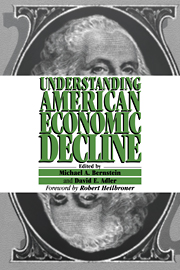
I don’t particularly like writing about the economic decline of this genuinely Great Nation. I prefer writing about creativity, or exploring technology, or talking about my books. Above all, I prefer humor. I get enormous pleasure from interjecting some wit—even if it is only a twist at the end of a piece—the kind of remark that will make you chuckle. I’m a great fan of the chuckle. Laughter is a wonderful thing, but I grew up in an environment where the chuckle was more common and dry wit the thing. It was also de rigeur to have a sense of the ridiculous—and, of course, it still is. Real life is more Monte Python than Plato.
The reason I do write about U.S. economic decline—and the economy in general, from time to time—is that I have some expertise in this area and I am genuinely concerned. I care.
I am also delusional enough to hope that I will get through to a few people who will initiate some remedial action. I have learned from experience that you don’t have influence a lot of people directly to make a difference. You merely have to connect with the right people—and “light the fuze.”
If that seems an impossible task, reflect that mass movements normally start with one person. You may feel like an insignificant ant in a country with a population of 316 million (and climbing) but you are not. You can make a difference—if you are so minded.
The frustrating thing about this current decline is that it is unnecessary. My research shows that there are solutions for just about every single problem this country faces—and most are proven. We also have more than sufficient resources to implement all of them—and at speed.
We have opted instead to be a nation of ostriches. The tag line below reads: “The motion has been made and seconded that we stick our heads in the sand.”
It seems to be the one and only thing we can agree on.

The following is an extract from the NYT of July 26 2014.
The inflation-adjusted net worth for the typical household was $87,992 in 2003. Ten years later, it was only $56,335, or a 36 percent decline, according to a study financed by the Russell Sage Foundation. Those are the figures for a household at the median point in the wealth distribution — the level at which there are an equal number of households whose worth is higher and lower. But during the same period, the net worth of wealthy households increased substantially.
“The housing bubble basically hid a trend of declining financial wealth at the median that began in 2001,” said Fabian T. Pfeffer, the University of Michigan professor who is lead author of the Russell Sage Foundation study.
The reasons for these declines are complex and controversial, but one point seems clear: When only a few people are winning and more than half the population is losing, surely something is amiss.
So one might think.
No comments:
Post a Comment